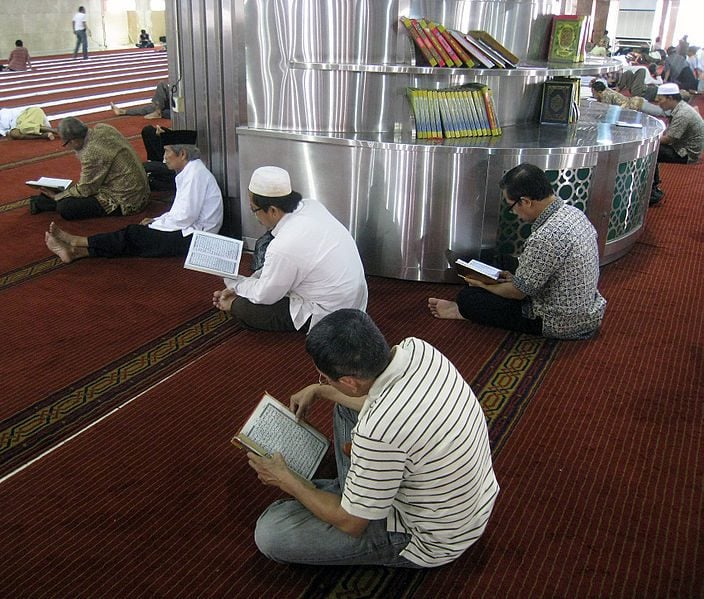
(Wikimedia Commons public domain photo by Gunawan Kartapranata)
I’ve been re-reading the Qur’an in M. A. S. Abdel Haleem’s Oxford World Classics version for Middle East Studies – Arabic [MESA] 320, the class that I’m currently teaching on the Qur’an in English translation. Here are a couple of similar passages that caught my attention just tonight:
This present life is merely an amusement and a diversion; the true life is in the Hereafter, if only they knew. Whenever they go on board a ship they call on God, and dedicate their faith to Him alone, but once He has delivered them safely back to land, see how they ascribe partners to Him! (Qur’an 29:64-65)
When something bad happens to people, they cry to their Lord and turn to Him for help, but no sooner does He let them taste His blessing than — lo and behold! — some of them ascribe partners to their Lord, showing no gratitude for what We have given them. (Qur’an 30:33-34)
They put me in mind of a passage in the Doctrine and Covenants that I’ve always found arresting:
They were slow to hearken unto the voice of the Lord their God; therefore, the Lord their God is slow to hearken unto their prayers, to answer them in the day of their trouble.
In the day of their peace they esteemed lightly my counsel; but, in the day of their trouble, of necessity they feel after me. (Doctrine and Covenants 101:7-8)
Roughly the same sentiment, I think, although expressed in rather different order.
One could argue that this sentiment is one of the major sub-themes of the Book of Mormon. The history of the Nephites goes through repeated cycles of humility, which leads to prayerful righteousness, which leads to a prosperous society, which leads to pride, which leads to catastrophic collapse, which leads to poverty, which leads to humility, which leads to prayerful righteousness, which leads to a prosperous society, which leads to pride, and so on and so forth.
It’s really quite plausible and entirely human.
The great fourteenth-century North African social theorist and philosopher of history Ibn Khaldun proposed a secular but nonetheless somewhat comparable four-generation cycle, based not only on his readings in history but on his experience with the regional politics of the Maghreb: A poor and tough group of nomads envy the wealthy people in an urban area. So they conquer the urban area and become its new rulers. At first, they maintain the toughness and the solidarity (Ibn Khaldun’s famous Arabic technical term for that “solidarity” is ‘asabiyya) that their poverty and nomadic lifestyle had enforced upon them, but then, in the next generation or so, they grow soft and lose their solidarity. Eventually, in the fourth generation, a poor and tough group of nomads circles the city, envying its wealthy residents.











